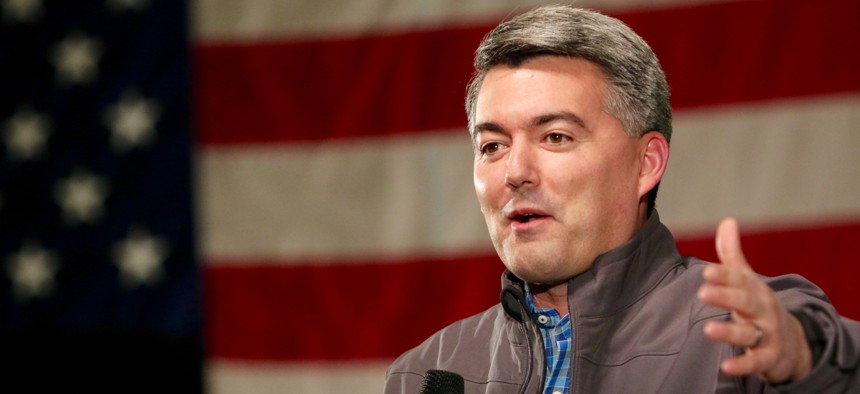Cautious Optimism From Marijuana States Following Senator’s Trump Assurance

U.S. Sen. Cory Gardner of Colorado Shutterstock

Connecting state and local government leaders
But “this president has demonstrated a willingness to go back on his word,” according to Washington state’s attorney general.
U.S. Sen. Cory Gardner announced on Friday that he was satisfied that the Justice Department under President Trump would not target the marijuana industry in states like Colorado that have legalized it and that the administration instead would support legislative efforts to safeguard state’s rights to legalize the drug.
Over the weekend, officials around the country who have been wary of the Trump administration’s approach to marijuana, adopted a wait-and-see approach in reaction to the news.
Gardner, as The Denver Post reported, said he talked by phone with Trump on Wednesday and that he “received a commitment that the Department of Justice’s rescission of the Cole memo will not impact Colorado’s legal marijuana industry… President Trump has assured me that he will support a federalism-based legislative solution to fix this states’ rights issue once and for all.”
Gardner, who has been the target of regular angry constituent protests in his swing-state since Trump took office, has taken the lead in standing up to the administration on the matter of marijuana.
In January, the Republican senator placed a hold on Trump nominees to the Justice Department after Attorney General Jeff Sessions, who has long opposed loosening laws around marijuana, revoked the Cole memo issued by then-President Barack Obama’s attorney general, Eric Holder. That memo discouraged federal authorities from pursuing marijuana prosecutions where state laws make the drug legal. On the Senate floor, Gardner furiously recalled that Sessions, in the run-up to his confirmation, pledged not to go after legal-marijuana states. Gardner said thousands of pot-industry jobs in Colorado were at stake.
Colorado and Washington state legalized marijuana for recreational use in 2014, leading a movement that has gained momentum in other states, including Alaska, California, Nevada and Oregon.
Washington state Attorney General Bob Ferguson greeted Gardner’s news with a critical eye.
“I am cautiously optimistic that the president appears to have heard the will of the people on this issue,” Ferguson said in a statement. “But this president has demonstrated a willingness to go back on his word. Until there is a formal agreement protecting Washington’s well-regulated marijuana industry, I will continue to stand ready to defend it.”
U.S. Rep. Earl Blumenauer, an Oregon Democrat and co-founder of the Congressional Cannabis Caucus, was similarly skeptical that real change on Capitol Hill would be coming soon.
“We should hope for the best, but not take anything for granted,” Blumenauer said, according to The Denver Post. “Trump changes his mind constantly, and Republican leadership is still in our way.”
U.S. Rep. Jared Polis, a Colorado Republican and another co-founder of the Cannabis Caucus, said he has already introduced a marijuana states’ rights bill that could be taken up anytime by the House Republican leaders.
“This is the type of solution I have advocated for during my time in Congress, most notably with the McClintock-Polis amendment, which I have repeatedly offered to prevent the federal government from interfering with states that have legalized marijuana,” Polis told The Cannabist, a Denver Post publication on the pot industry.
Colorado Gov. John Hickenlooper called the news “promising” in a statement to The Cannabist, adding that federal law-enforcement resources would be better dedicated elsewhere. “The Department of Justice will get far greater benefit per dollars spent by continuing to focus on major crimes such as heroin, meth and human trafficking,” he said.
Over the years, Trump has given mixed signals on hot-button “culture war” policy issues, but as president he has leaned on staunchly conservative advisers and cabinet members to shape his official policy approaches. On abortion, gay rights and gun laws, for example, he has ultimately embraced hard-line stances. On marijuana legalization, things seemed to be going the same direction.
On the campaign trail—in interviews with the press and at campaign rallies—Trump voiced support for the states’ rights arguments on legalization, but in January, after Sessions seemed to be shifting the Justice Department stance, it looked suddenly as though a new battle in the conservative “war on drugs” was coming to the states—including states like Colorado and Washington where the pot industry has been booming under painstakingly wrought state regulatory regimes.
Gardner is reportedly working on a bipartisan bill to protect state legalization.
Congress so far has managed only to pass stop-gap provisions that limit the resources the Justice Department can use to interfere in state-based marijuana business activity.
Proposals related to marijuana industry banking, taxes, research and education have been sidetracked for years by conservative congressional leaders.
As has been widely reported, however, at least two major Republican figures are pressing for change. In a letter this week, U.S. Sen. Orrin Hatch, a Utah Republican, urged Sessions to stop efforts to hamstring medical marijuana research projects at the Drug Enforcement Administration. And former House Speaker John Boehner, a one-time opponent of legalization, announced he has joined the board of directors for a cannabis company and is championing efforts to allow veterans to use marijuana for medical purposes.
John Tomasic is a journalist based in Seattle.

NEXT STORY: A Salmonella Recall Is Affecting 207 Million Eggs Across the U.S.




